Influence of Organizational Components on Individual and Team Behavior
VerifiedAdded on 2023/01/17
|16
|5218
|71
AI Summary
This report discusses the impact of organizational culture, power, and politics on individual and team behavior and performance. It also explores different theories of motivation and their effect on behavior. The report provides recommendations for creating a positive work environment and improving team cooperation.
Contribute Materials
Your contribution can guide someone’s learning journey. Share your
documents today.
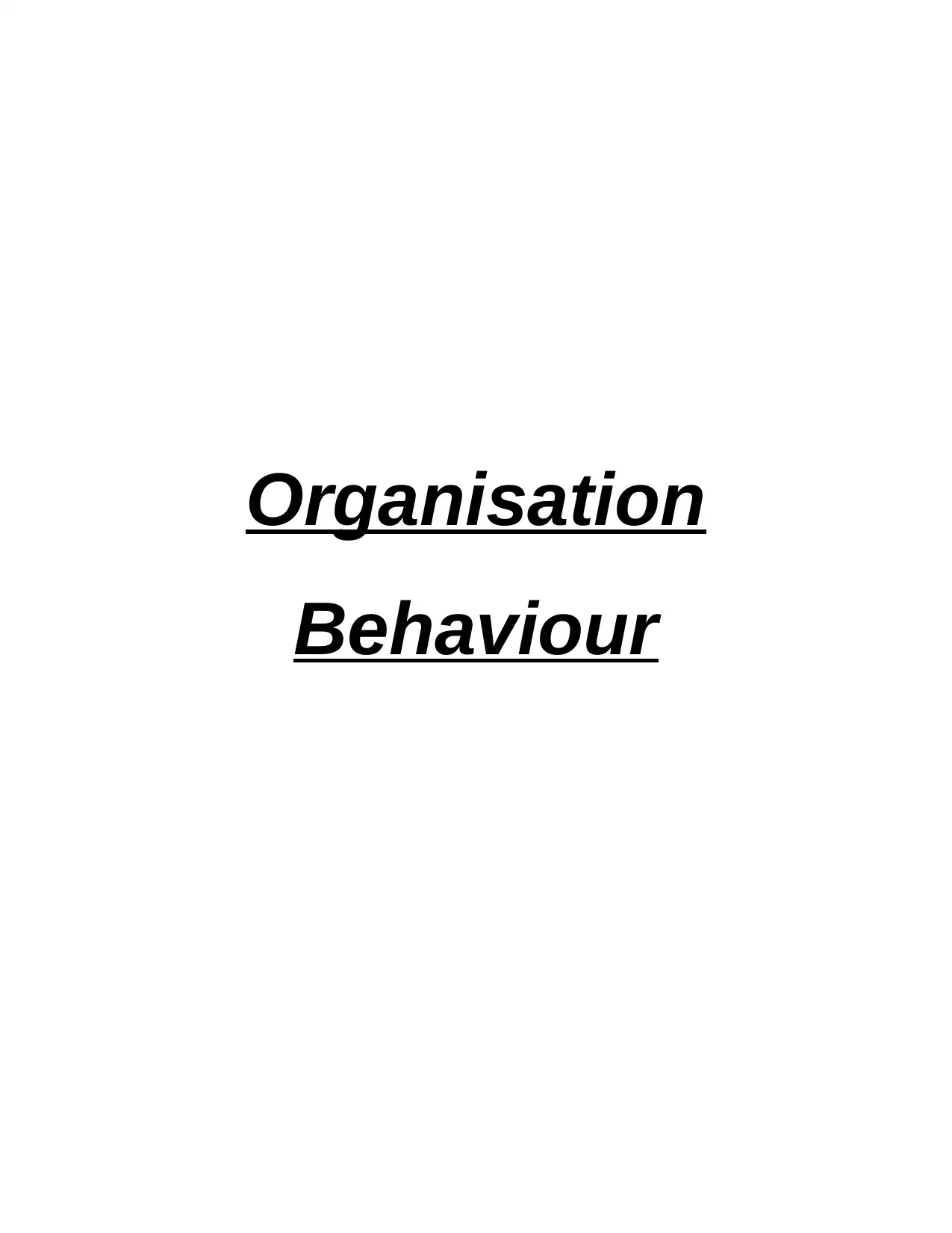
Organisation
Behaviour
Behaviour
Secure Best Marks with AI Grader
Need help grading? Try our AI Grader for instant feedback on your assignments.
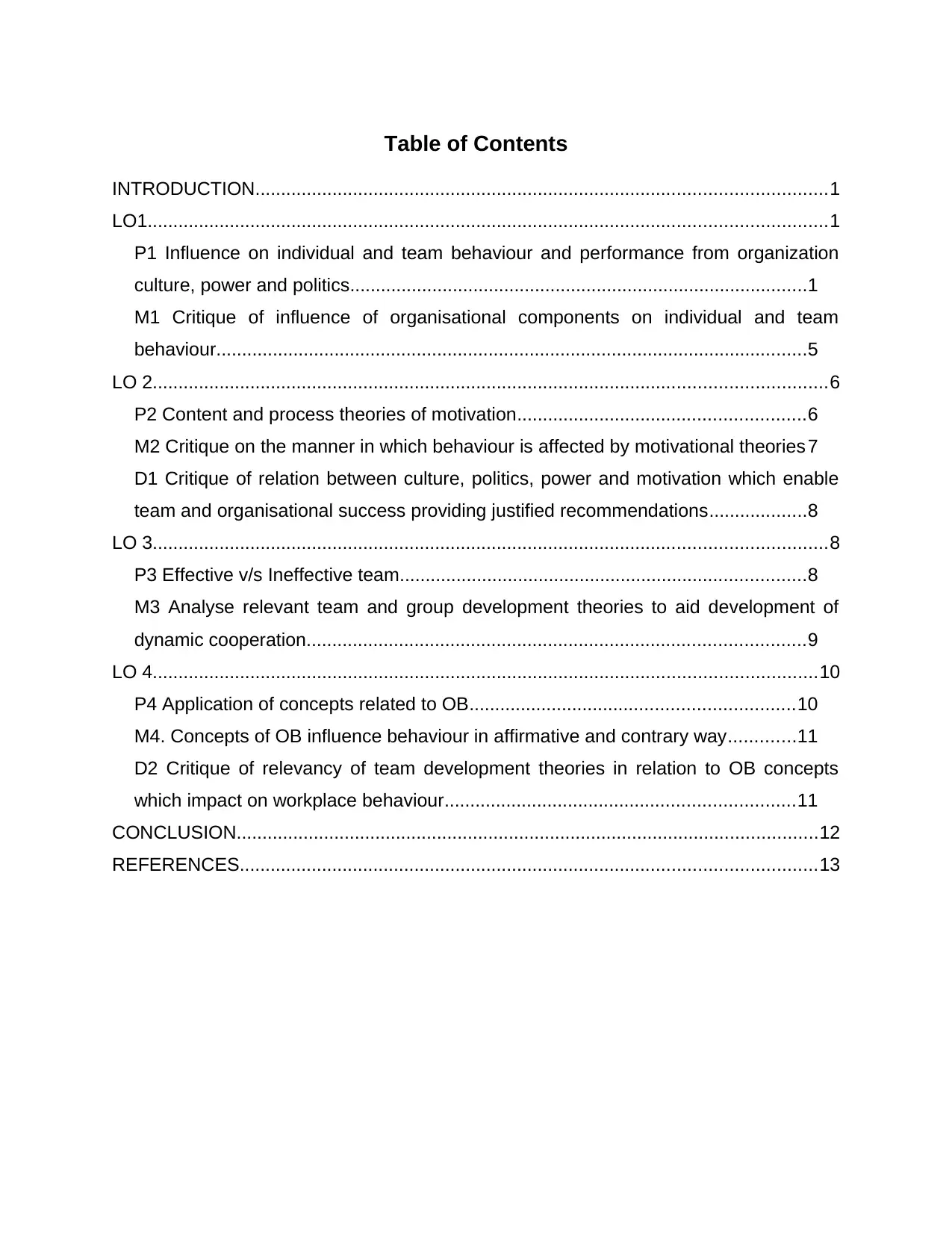
Table of Contents
INTRODUCTION...............................................................................................................1
LO1....................................................................................................................................1
P1 Influence on individual and team behaviour and performance from organization
culture, power and politics.........................................................................................1
M1 Critique of influence of organisational components on individual and team
behaviour...................................................................................................................5
LO 2...................................................................................................................................6
P2 Content and process theories of motivation........................................................6
M2 Critique on the manner in which behaviour is affected by motivational theories 7
D1 Critique of relation between culture, politics, power and motivation which enable
team and organisational success providing justified recommendations...................8
LO 3...................................................................................................................................8
P3 Effective v/s Ineffective team...............................................................................8
M3 Analyse relevant team and group development theories to aid development of
dynamic cooperation.................................................................................................9
LO 4.................................................................................................................................10
P4 Application of concepts related to OB...............................................................10
M4. Concepts of OB influence behaviour in affirmative and contrary way.............11
D2 Critique of relevancy of team development theories in relation to OB concepts
which impact on workplace behaviour....................................................................11
CONCLUSION.................................................................................................................12
REFERENCES................................................................................................................13
INTRODUCTION...............................................................................................................1
LO1....................................................................................................................................1
P1 Influence on individual and team behaviour and performance from organization
culture, power and politics.........................................................................................1
M1 Critique of influence of organisational components on individual and team
behaviour...................................................................................................................5
LO 2...................................................................................................................................6
P2 Content and process theories of motivation........................................................6
M2 Critique on the manner in which behaviour is affected by motivational theories 7
D1 Critique of relation between culture, politics, power and motivation which enable
team and organisational success providing justified recommendations...................8
LO 3...................................................................................................................................8
P3 Effective v/s Ineffective team...............................................................................8
M3 Analyse relevant team and group development theories to aid development of
dynamic cooperation.................................................................................................9
LO 4.................................................................................................................................10
P4 Application of concepts related to OB...............................................................10
M4. Concepts of OB influence behaviour in affirmative and contrary way.............11
D2 Critique of relevancy of team development theories in relation to OB concepts
which impact on workplace behaviour....................................................................11
CONCLUSION.................................................................................................................12
REFERENCES................................................................................................................13
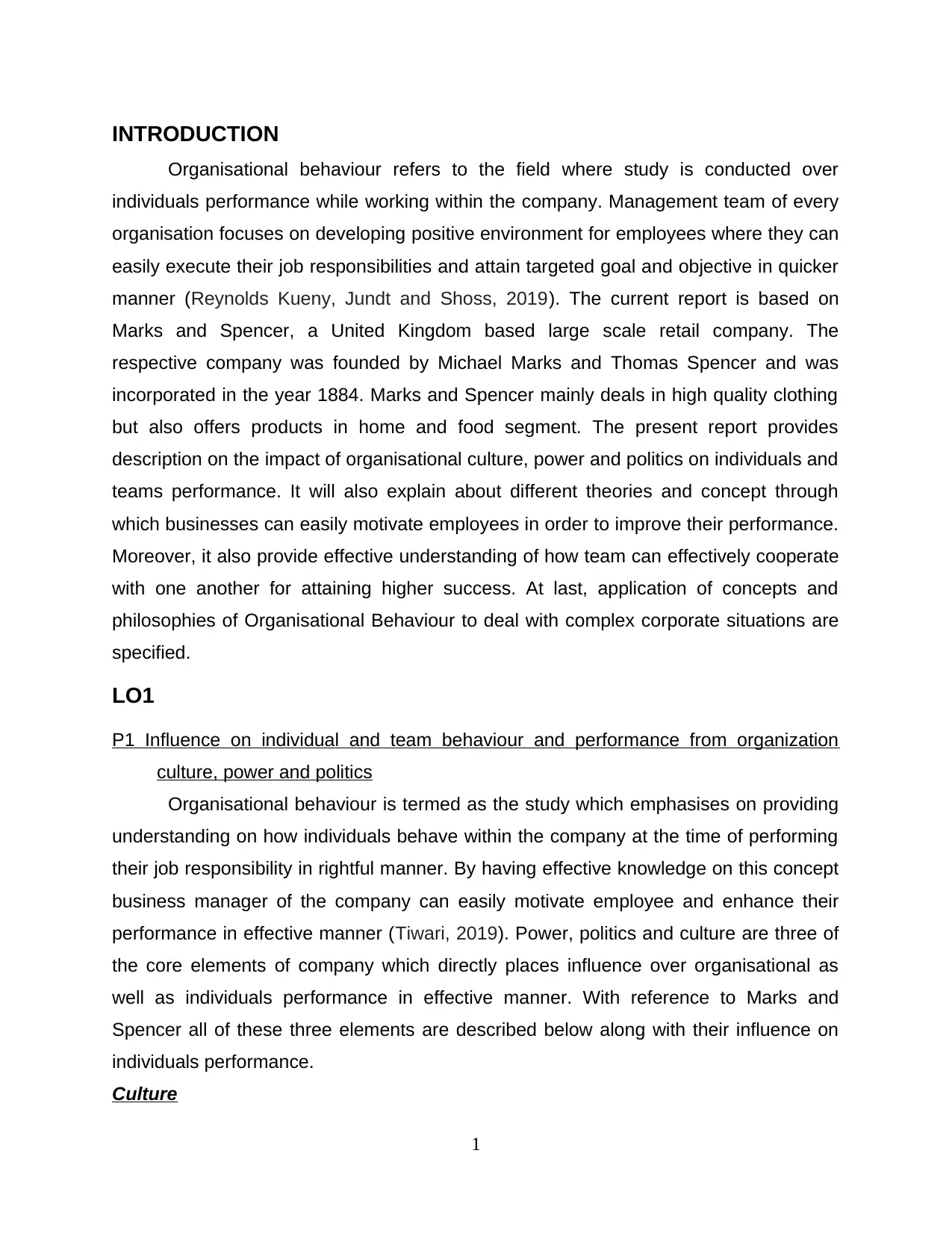
INTRODUCTION
Organisational behaviour refers to the field where study is conducted over
individuals performance while working within the company. Management team of every
organisation focuses on developing positive environment for employees where they can
easily execute their job responsibilities and attain targeted goal and objective in quicker
manner (Reynolds Kueny, Jundt and Shoss, 2019). The current report is based on
Marks and Spencer, a United Kingdom based large scale retail company. The
respective company was founded by Michael Marks and Thomas Spencer and was
incorporated in the year 1884. Marks and Spencer mainly deals in high quality clothing
but also offers products in home and food segment. The present report provides
description on the impact of organisational culture, power and politics on individuals and
teams performance. It will also explain about different theories and concept through
which businesses can easily motivate employees in order to improve their performance.
Moreover, it also provide effective understanding of how team can effectively cooperate
with one another for attaining higher success. At last, application of concepts and
philosophies of Organisational Behaviour to deal with complex corporate situations are
specified.
LO1
P1 Influence on individual and team behaviour and performance from organization
culture, power and politics
Organisational behaviour is termed as the study which emphasises on providing
understanding on how individuals behave within the company at the time of performing
their job responsibility in rightful manner. By having effective knowledge on this concept
business manager of the company can easily motivate employee and enhance their
performance in effective manner (Tiwari, 2019). Power, politics and culture are three of
the core elements of company which directly places influence over organisational as
well as individuals performance in effective manner. With reference to Marks and
Spencer all of these three elements are described below along with their influence on
individuals performance.
Culture
1
Organisational behaviour refers to the field where study is conducted over
individuals performance while working within the company. Management team of every
organisation focuses on developing positive environment for employees where they can
easily execute their job responsibilities and attain targeted goal and objective in quicker
manner (Reynolds Kueny, Jundt and Shoss, 2019). The current report is based on
Marks and Spencer, a United Kingdom based large scale retail company. The
respective company was founded by Michael Marks and Thomas Spencer and was
incorporated in the year 1884. Marks and Spencer mainly deals in high quality clothing
but also offers products in home and food segment. The present report provides
description on the impact of organisational culture, power and politics on individuals and
teams performance. It will also explain about different theories and concept through
which businesses can easily motivate employees in order to improve their performance.
Moreover, it also provide effective understanding of how team can effectively cooperate
with one another for attaining higher success. At last, application of concepts and
philosophies of Organisational Behaviour to deal with complex corporate situations are
specified.
LO1
P1 Influence on individual and team behaviour and performance from organization
culture, power and politics
Organisational behaviour is termed as the study which emphasises on providing
understanding on how individuals behave within the company at the time of performing
their job responsibility in rightful manner. By having effective knowledge on this concept
business manager of the company can easily motivate employee and enhance their
performance in effective manner (Tiwari, 2019). Power, politics and culture are three of
the core elements of company which directly places influence over organisational as
well as individuals performance in effective manner. With reference to Marks and
Spencer all of these three elements are described below along with their influence on
individuals performance.
Culture
1
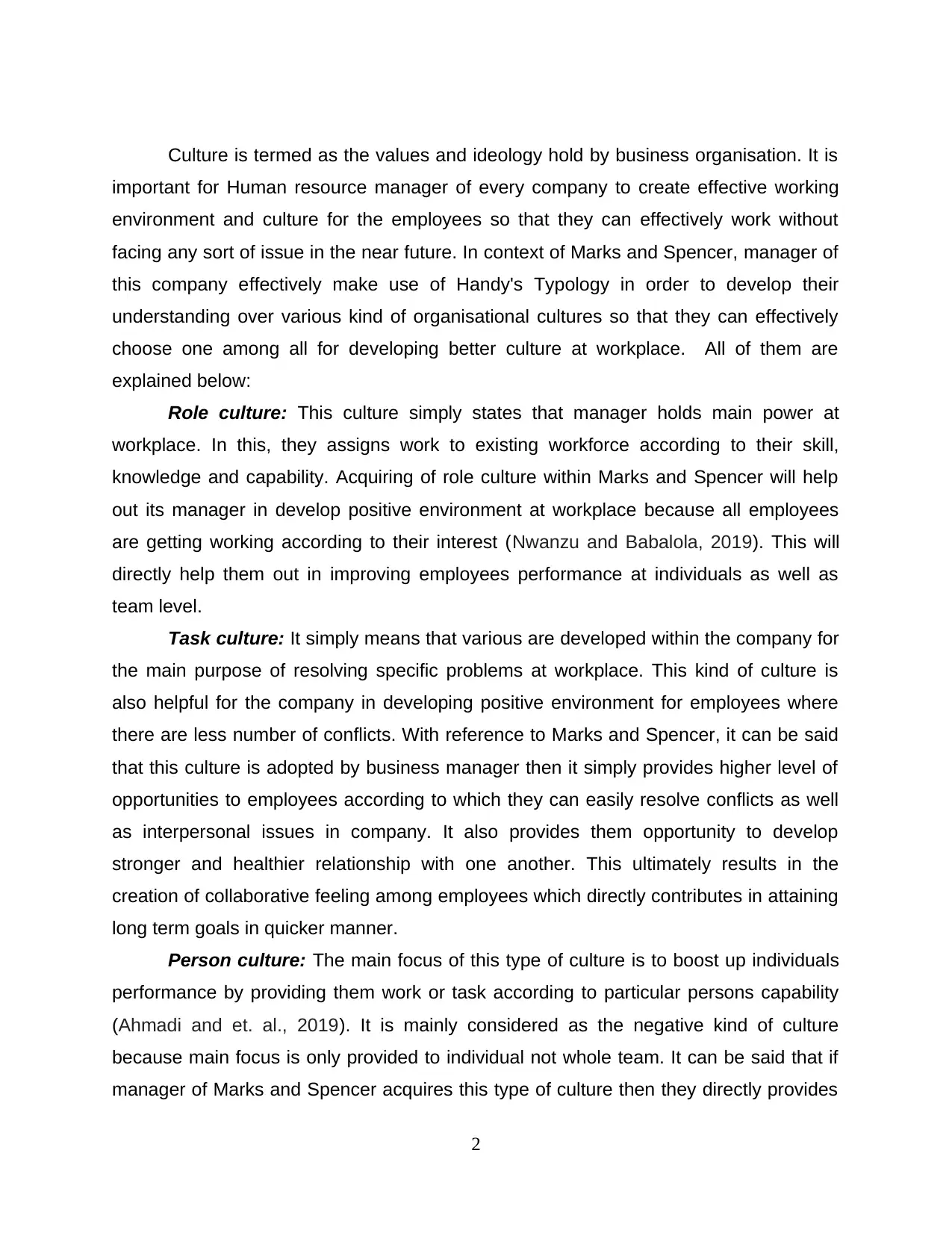
Culture is termed as the values and ideology hold by business organisation. It is
important for Human resource manager of every company to create effective working
environment and culture for the employees so that they can effectively work without
facing any sort of issue in the near future. In context of Marks and Spencer, manager of
this company effectively make use of Handy's Typology in order to develop their
understanding over various kind of organisational cultures so that they can effectively
choose one among all for developing better culture at workplace. All of them are
explained below:
Role culture: This culture simply states that manager holds main power at
workplace. In this, they assigns work to existing workforce according to their skill,
knowledge and capability. Acquiring of role culture within Marks and Spencer will help
out its manager in develop positive environment at workplace because all employees
are getting working according to their interest (Nwanzu and Babalola, 2019). This will
directly help them out in improving employees performance at individuals as well as
team level.
Task culture: It simply means that various are developed within the company for
the main purpose of resolving specific problems at workplace. This kind of culture is
also helpful for the company in developing positive environment for employees where
there are less number of conflicts. With reference to Marks and Spencer, it can be said
that this culture is adopted by business manager then it simply provides higher level of
opportunities to employees according to which they can easily resolve conflicts as well
as interpersonal issues in company. It also provides them opportunity to develop
stronger and healthier relationship with one another. This ultimately results in the
creation of collaborative feeling among employees which directly contributes in attaining
long term goals in quicker manner.
Person culture: The main focus of this type of culture is to boost up individuals
performance by providing them work or task according to particular persons capability
(Ahmadi and et. al., 2019). It is mainly considered as the negative kind of culture
because main focus is only provided to individual not whole team. It can be said that if
manager of Marks and Spencer acquires this type of culture then they directly provides
2
important for Human resource manager of every company to create effective working
environment and culture for the employees so that they can effectively work without
facing any sort of issue in the near future. In context of Marks and Spencer, manager of
this company effectively make use of Handy's Typology in order to develop their
understanding over various kind of organisational cultures so that they can effectively
choose one among all for developing better culture at workplace. All of them are
explained below:
Role culture: This culture simply states that manager holds main power at
workplace. In this, they assigns work to existing workforce according to their skill,
knowledge and capability. Acquiring of role culture within Marks and Spencer will help
out its manager in develop positive environment at workplace because all employees
are getting working according to their interest (Nwanzu and Babalola, 2019). This will
directly help them out in improving employees performance at individuals as well as
team level.
Task culture: It simply means that various are developed within the company for
the main purpose of resolving specific problems at workplace. This kind of culture is
also helpful for the company in developing positive environment for employees where
there are less number of conflicts. With reference to Marks and Spencer, it can be said
that this culture is adopted by business manager then it simply provides higher level of
opportunities to employees according to which they can easily resolve conflicts as well
as interpersonal issues in company. It also provides them opportunity to develop
stronger and healthier relationship with one another. This ultimately results in the
creation of collaborative feeling among employees which directly contributes in attaining
long term goals in quicker manner.
Person culture: The main focus of this type of culture is to boost up individuals
performance by providing them work or task according to particular persons capability
(Ahmadi and et. al., 2019). It is mainly considered as the negative kind of culture
because main focus is only provided to individual not whole team. It can be said that if
manager of Marks and Spencer acquires this type of culture then they directly provides
2
Secure Best Marks with AI Grader
Need help grading? Try our AI Grader for instant feedback on your assignments.
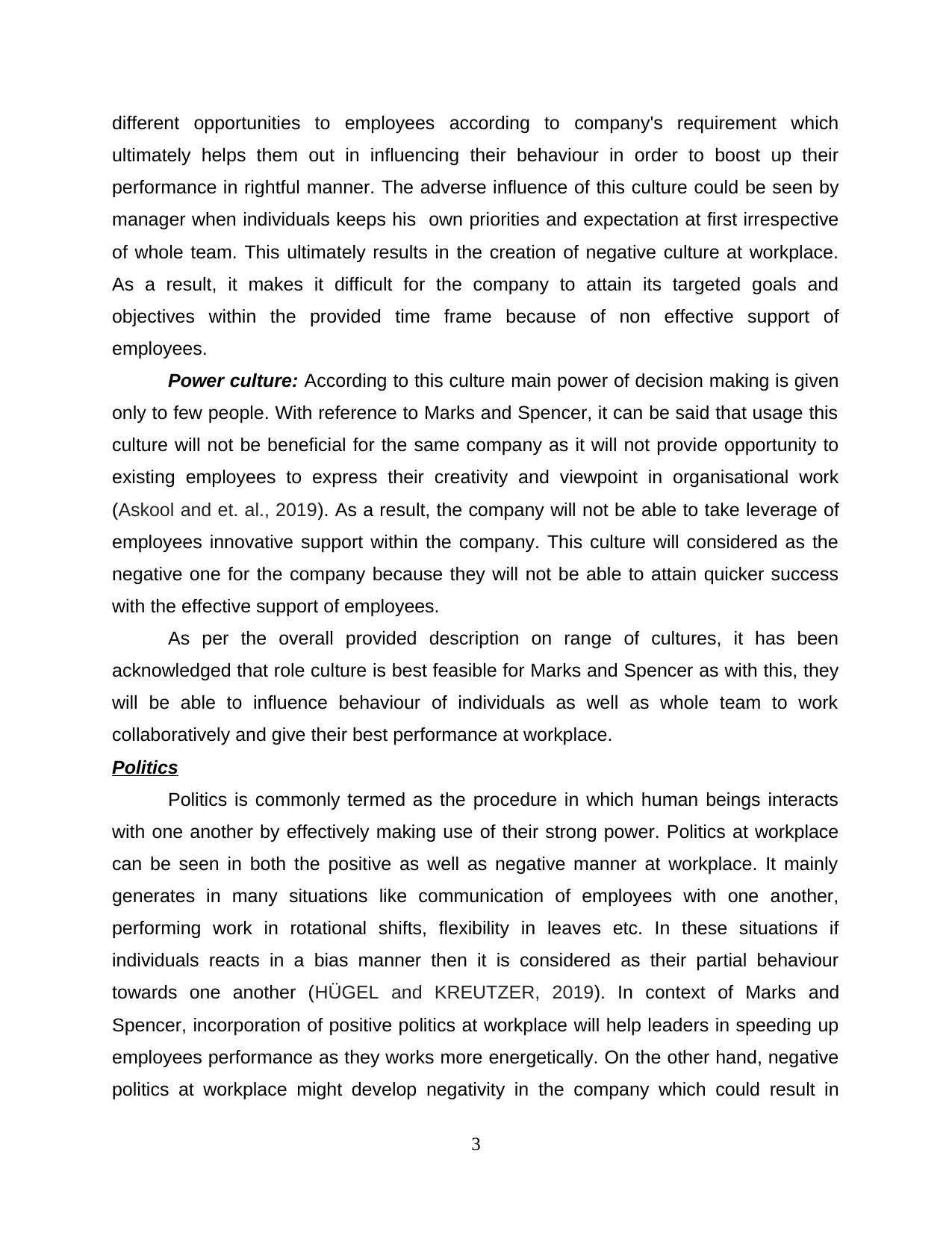
different opportunities to employees according to company's requirement which
ultimately helps them out in influencing their behaviour in order to boost up their
performance in rightful manner. The adverse influence of this culture could be seen by
manager when individuals keeps his own priorities and expectation at first irrespective
of whole team. This ultimately results in the creation of negative culture at workplace.
As a result, it makes it difficult for the company to attain its targeted goals and
objectives within the provided time frame because of non effective support of
employees.
Power culture: According to this culture main power of decision making is given
only to few people. With reference to Marks and Spencer, it can be said that usage this
culture will not be beneficial for the same company as it will not provide opportunity to
existing employees to express their creativity and viewpoint in organisational work
(Askool and et. al., 2019). As a result, the company will not be able to take leverage of
employees innovative support within the company. This culture will considered as the
negative one for the company because they will not be able to attain quicker success
with the effective support of employees.
As per the overall provided description on range of cultures, it has been
acknowledged that role culture is best feasible for Marks and Spencer as with this, they
will be able to influence behaviour of individuals as well as whole team to work
collaboratively and give their best performance at workplace.
Politics
Politics is commonly termed as the procedure in which human beings interacts
with one another by effectively making use of their strong power. Politics at workplace
can be seen in both the positive as well as negative manner at workplace. It mainly
generates in many situations like communication of employees with one another,
performing work in rotational shifts, flexibility in leaves etc. In these situations if
individuals reacts in a bias manner then it is considered as their partial behaviour
towards one another (HÜGEL and KREUTZER, 2019). In context of Marks and
Spencer, incorporation of positive politics at workplace will help leaders in speeding up
employees performance as they works more energetically. On the other hand, negative
politics at workplace might develop negativity in the company which could result in
3
ultimately helps them out in influencing their behaviour in order to boost up their
performance in rightful manner. The adverse influence of this culture could be seen by
manager when individuals keeps his own priorities and expectation at first irrespective
of whole team. This ultimately results in the creation of negative culture at workplace.
As a result, it makes it difficult for the company to attain its targeted goals and
objectives within the provided time frame because of non effective support of
employees.
Power culture: According to this culture main power of decision making is given
only to few people. With reference to Marks and Spencer, it can be said that usage this
culture will not be beneficial for the same company as it will not provide opportunity to
existing employees to express their creativity and viewpoint in organisational work
(Askool and et. al., 2019). As a result, the company will not be able to take leverage of
employees innovative support within the company. This culture will considered as the
negative one for the company because they will not be able to attain quicker success
with the effective support of employees.
As per the overall provided description on range of cultures, it has been
acknowledged that role culture is best feasible for Marks and Spencer as with this, they
will be able to influence behaviour of individuals as well as whole team to work
collaboratively and give their best performance at workplace.
Politics
Politics is commonly termed as the procedure in which human beings interacts
with one another by effectively making use of their strong power. Politics at workplace
can be seen in both the positive as well as negative manner at workplace. It mainly
generates in many situations like communication of employees with one another,
performing work in rotational shifts, flexibility in leaves etc. In these situations if
individuals reacts in a bias manner then it is considered as their partial behaviour
towards one another (HÜGEL and KREUTZER, 2019). In context of Marks and
Spencer, incorporation of positive politics at workplace will help leaders in speeding up
employees performance as they works more energetically. On the other hand, negative
politics at workplace might develop negativity in the company which could result in
3
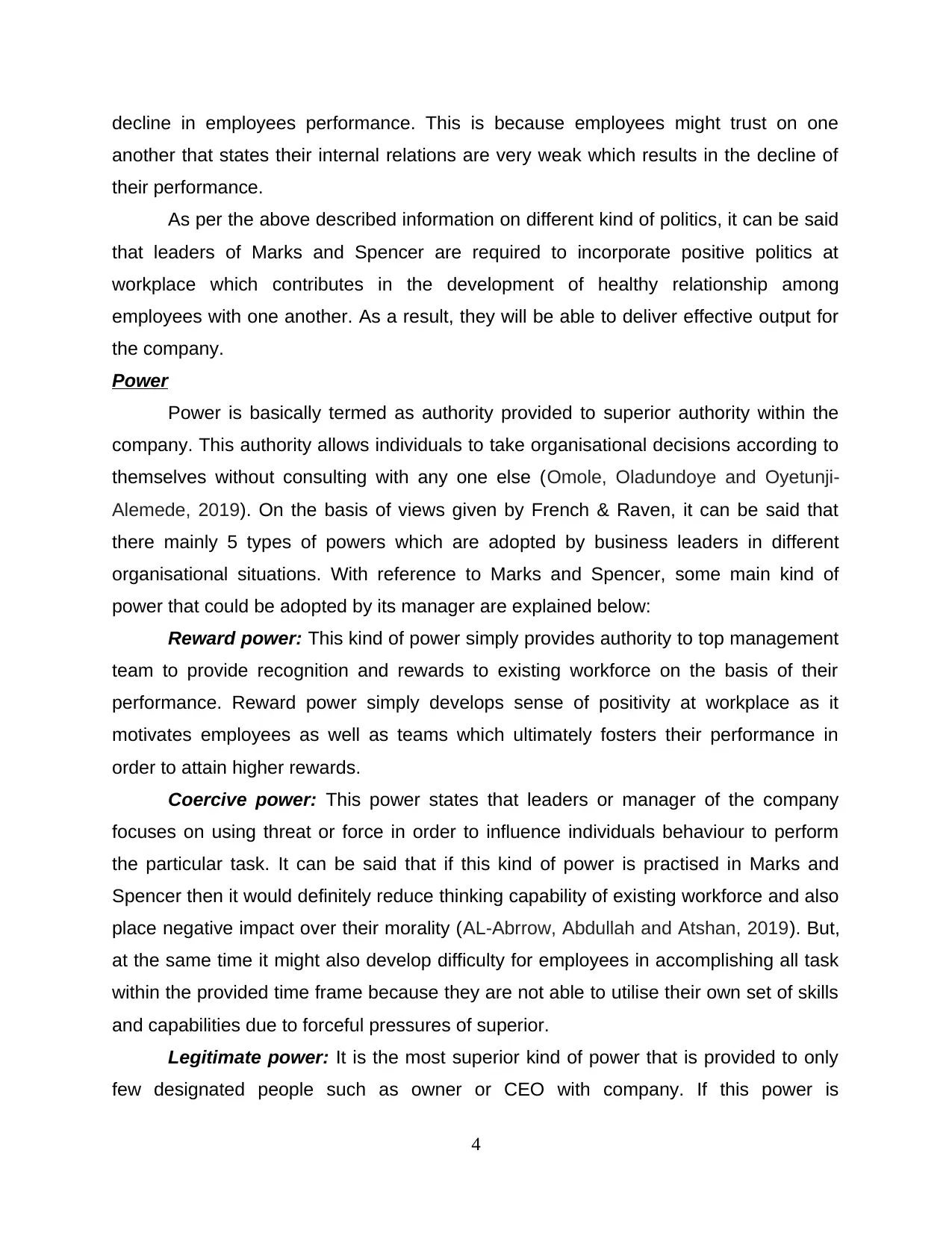
decline in employees performance. This is because employees might trust on one
another that states their internal relations are very weak which results in the decline of
their performance.
As per the above described information on different kind of politics, it can be said
that leaders of Marks and Spencer are required to incorporate positive politics at
workplace which contributes in the development of healthy relationship among
employees with one another. As a result, they will be able to deliver effective output for
the company.
Power
Power is basically termed as authority provided to superior authority within the
company. This authority allows individuals to take organisational decisions according to
themselves without consulting with any one else (Omole, Oladundoye and Oyetunji-
Alemede, 2019). On the basis of views given by French & Raven, it can be said that
there mainly 5 types of powers which are adopted by business leaders in different
organisational situations. With reference to Marks and Spencer, some main kind of
power that could be adopted by its manager are explained below:
Reward power: This kind of power simply provides authority to top management
team to provide recognition and rewards to existing workforce on the basis of their
performance. Reward power simply develops sense of positivity at workplace as it
motivates employees as well as teams which ultimately fosters their performance in
order to attain higher rewards.
Coercive power: This power states that leaders or manager of the company
focuses on using threat or force in order to influence individuals behaviour to perform
the particular task. It can be said that if this kind of power is practised in Marks and
Spencer then it would definitely reduce thinking capability of existing workforce and also
place negative impact over their morality (AL-Abrrow, Abdullah and Atshan, 2019). But,
at the same time it might also develop difficulty for employees in accomplishing all task
within the provided time frame because they are not able to utilise their own set of skills
and capabilities due to forceful pressures of superior.
Legitimate power: It is the most superior kind of power that is provided to only
few designated people such as owner or CEO with company. If this power is
4
another that states their internal relations are very weak which results in the decline of
their performance.
As per the above described information on different kind of politics, it can be said
that leaders of Marks and Spencer are required to incorporate positive politics at
workplace which contributes in the development of healthy relationship among
employees with one another. As a result, they will be able to deliver effective output for
the company.
Power
Power is basically termed as authority provided to superior authority within the
company. This authority allows individuals to take organisational decisions according to
themselves without consulting with any one else (Omole, Oladundoye and Oyetunji-
Alemede, 2019). On the basis of views given by French & Raven, it can be said that
there mainly 5 types of powers which are adopted by business leaders in different
organisational situations. With reference to Marks and Spencer, some main kind of
power that could be adopted by its manager are explained below:
Reward power: This kind of power simply provides authority to top management
team to provide recognition and rewards to existing workforce on the basis of their
performance. Reward power simply develops sense of positivity at workplace as it
motivates employees as well as teams which ultimately fosters their performance in
order to attain higher rewards.
Coercive power: This power states that leaders or manager of the company
focuses on using threat or force in order to influence individuals behaviour to perform
the particular task. It can be said that if this kind of power is practised in Marks and
Spencer then it would definitely reduce thinking capability of existing workforce and also
place negative impact over their morality (AL-Abrrow, Abdullah and Atshan, 2019). But,
at the same time it might also develop difficulty for employees in accomplishing all task
within the provided time frame because they are not able to utilise their own set of skills
and capabilities due to forceful pressures of superior.
Legitimate power: It is the most superior kind of power that is provided to only
few designated people such as owner or CEO with company. If this power is
4
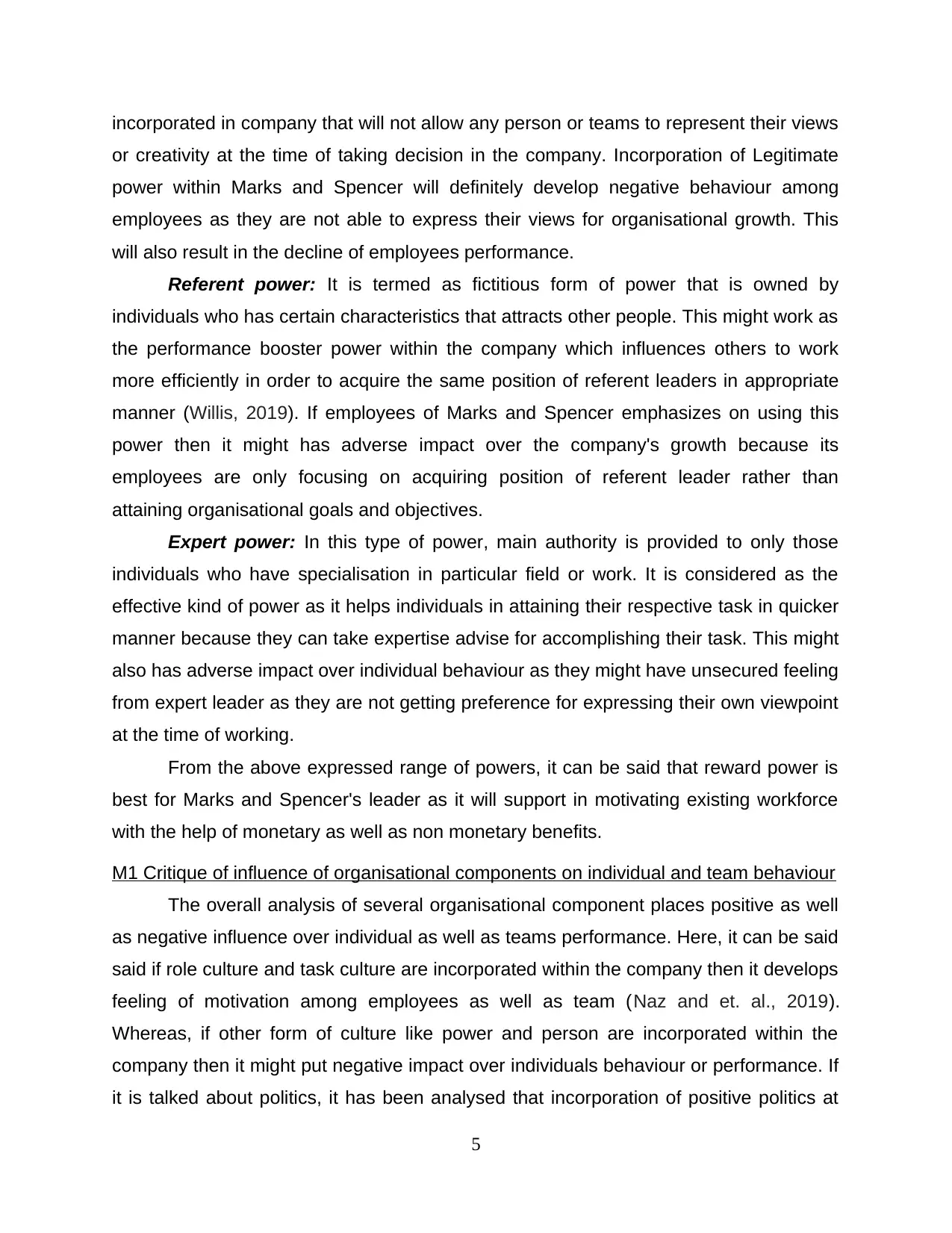
incorporated in company that will not allow any person or teams to represent their views
or creativity at the time of taking decision in the company. Incorporation of Legitimate
power within Marks and Spencer will definitely develop negative behaviour among
employees as they are not able to express their views for organisational growth. This
will also result in the decline of employees performance.
Referent power: It is termed as fictitious form of power that is owned by
individuals who has certain characteristics that attracts other people. This might work as
the performance booster power within the company which influences others to work
more efficiently in order to acquire the same position of referent leaders in appropriate
manner (Willis, 2019). If employees of Marks and Spencer emphasizes on using this
power then it might has adverse impact over the company's growth because its
employees are only focusing on acquiring position of referent leader rather than
attaining organisational goals and objectives.
Expert power: In this type of power, main authority is provided to only those
individuals who have specialisation in particular field or work. It is considered as the
effective kind of power as it helps individuals in attaining their respective task in quicker
manner because they can take expertise advise for accomplishing their task. This might
also has adverse impact over individual behaviour as they might have unsecured feeling
from expert leader as they are not getting preference for expressing their own viewpoint
at the time of working.
From the above expressed range of powers, it can be said that reward power is
best for Marks and Spencer's leader as it will support in motivating existing workforce
with the help of monetary as well as non monetary benefits.
M1 Critique of influence of organisational components on individual and team behaviour
The overall analysis of several organisational component places positive as well
as negative influence over individual as well as teams performance. Here, it can be said
said if role culture and task culture are incorporated within the company then it develops
feeling of motivation among employees as well as team (Naz and et. al., 2019).
Whereas, if other form of culture like power and person are incorporated within the
company then it might put negative impact over individuals behaviour or performance. If
it is talked about politics, it has been analysed that incorporation of positive politics at
5
or creativity at the time of taking decision in the company. Incorporation of Legitimate
power within Marks and Spencer will definitely develop negative behaviour among
employees as they are not able to express their views for organisational growth. This
will also result in the decline of employees performance.
Referent power: It is termed as fictitious form of power that is owned by
individuals who has certain characteristics that attracts other people. This might work as
the performance booster power within the company which influences others to work
more efficiently in order to acquire the same position of referent leaders in appropriate
manner (Willis, 2019). If employees of Marks and Spencer emphasizes on using this
power then it might has adverse impact over the company's growth because its
employees are only focusing on acquiring position of referent leader rather than
attaining organisational goals and objectives.
Expert power: In this type of power, main authority is provided to only those
individuals who have specialisation in particular field or work. It is considered as the
effective kind of power as it helps individuals in attaining their respective task in quicker
manner because they can take expertise advise for accomplishing their task. This might
also has adverse impact over individual behaviour as they might have unsecured feeling
from expert leader as they are not getting preference for expressing their own viewpoint
at the time of working.
From the above expressed range of powers, it can be said that reward power is
best for Marks and Spencer's leader as it will support in motivating existing workforce
with the help of monetary as well as non monetary benefits.
M1 Critique of influence of organisational components on individual and team behaviour
The overall analysis of several organisational component places positive as well
as negative influence over individual as well as teams performance. Here, it can be said
said if role culture and task culture are incorporated within the company then it develops
feeling of motivation among employees as well as team (Naz and et. al., 2019).
Whereas, if other form of culture like power and person are incorporated within the
company then it might put negative impact over individuals behaviour or performance. If
it is talked about politics, it has been analysed that incorporation of positive politics at
5
Paraphrase This Document
Need a fresh take? Get an instant paraphrase of this document with our AI Paraphraser
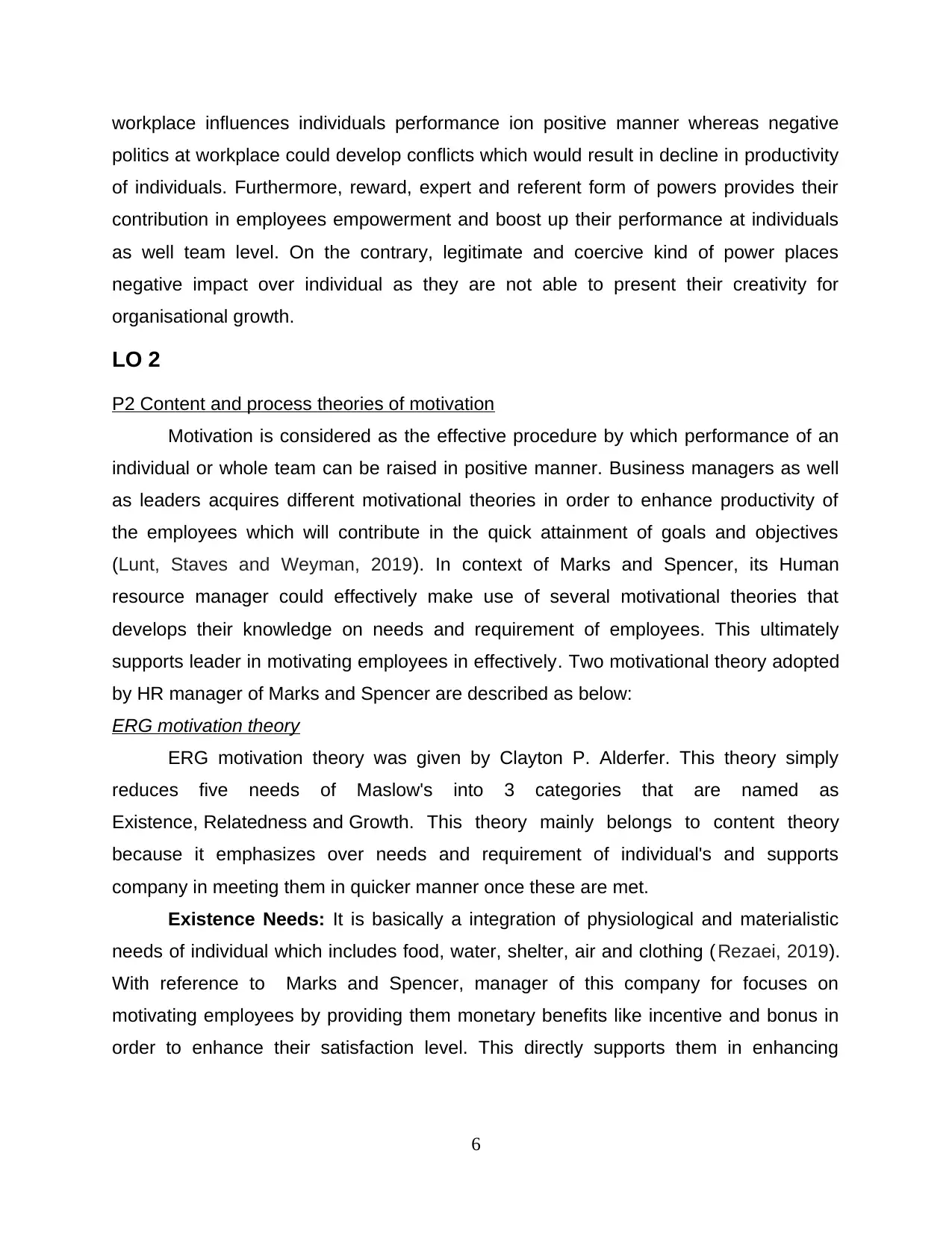
workplace influences individuals performance ion positive manner whereas negative
politics at workplace could develop conflicts which would result in decline in productivity
of individuals. Furthermore, reward, expert and referent form of powers provides their
contribution in employees empowerment and boost up their performance at individuals
as well team level. On the contrary, legitimate and coercive kind of power places
negative impact over individual as they are not able to present their creativity for
organisational growth.
LO 2
P2 Content and process theories of motivation
Motivation is considered as the effective procedure by which performance of an
individual or whole team can be raised in positive manner. Business managers as well
as leaders acquires different motivational theories in order to enhance productivity of
the employees which will contribute in the quick attainment of goals and objectives
(Lunt, Staves and Weyman, 2019). In context of Marks and Spencer, its Human
resource manager could effectively make use of several motivational theories that
develops their knowledge on needs and requirement of employees. This ultimately
supports leader in motivating employees in effectively. Two motivational theory adopted
by HR manager of Marks and Spencer are described as below:
ERG motivation theory
ERG motivation theory was given by Clayton P. Alderfer. This theory simply
reduces five needs of Maslow's into 3 categories that are named as
Existence, Relatedness and Growth. This theory mainly belongs to content theory
because it emphasizes over needs and requirement of individual's and supports
company in meeting them in quicker manner once these are met.
Existence Needs: It is basically a integration of physiological and materialistic
needs of individual which includes food, water, shelter, air and clothing ( Rezaei, 2019).
With reference to Marks and Spencer, manager of this company for focuses on
motivating employees by providing them monetary benefits like incentive and bonus in
order to enhance their satisfaction level. This directly supports them in enhancing
6
politics at workplace could develop conflicts which would result in decline in productivity
of individuals. Furthermore, reward, expert and referent form of powers provides their
contribution in employees empowerment and boost up their performance at individuals
as well team level. On the contrary, legitimate and coercive kind of power places
negative impact over individual as they are not able to present their creativity for
organisational growth.
LO 2
P2 Content and process theories of motivation
Motivation is considered as the effective procedure by which performance of an
individual or whole team can be raised in positive manner. Business managers as well
as leaders acquires different motivational theories in order to enhance productivity of
the employees which will contribute in the quick attainment of goals and objectives
(Lunt, Staves and Weyman, 2019). In context of Marks and Spencer, its Human
resource manager could effectively make use of several motivational theories that
develops their knowledge on needs and requirement of employees. This ultimately
supports leader in motivating employees in effectively. Two motivational theory adopted
by HR manager of Marks and Spencer are described as below:
ERG motivation theory
ERG motivation theory was given by Clayton P. Alderfer. This theory simply
reduces five needs of Maslow's into 3 categories that are named as
Existence, Relatedness and Growth. This theory mainly belongs to content theory
because it emphasizes over needs and requirement of individual's and supports
company in meeting them in quicker manner once these are met.
Existence Needs: It is basically a integration of physiological and materialistic
needs of individual which includes food, water, shelter, air and clothing ( Rezaei, 2019).
With reference to Marks and Spencer, manager of this company for focuses on
motivating employees by providing them monetary benefits like incentive and bonus in
order to enhance their satisfaction level. This directly supports them in enhancing
6
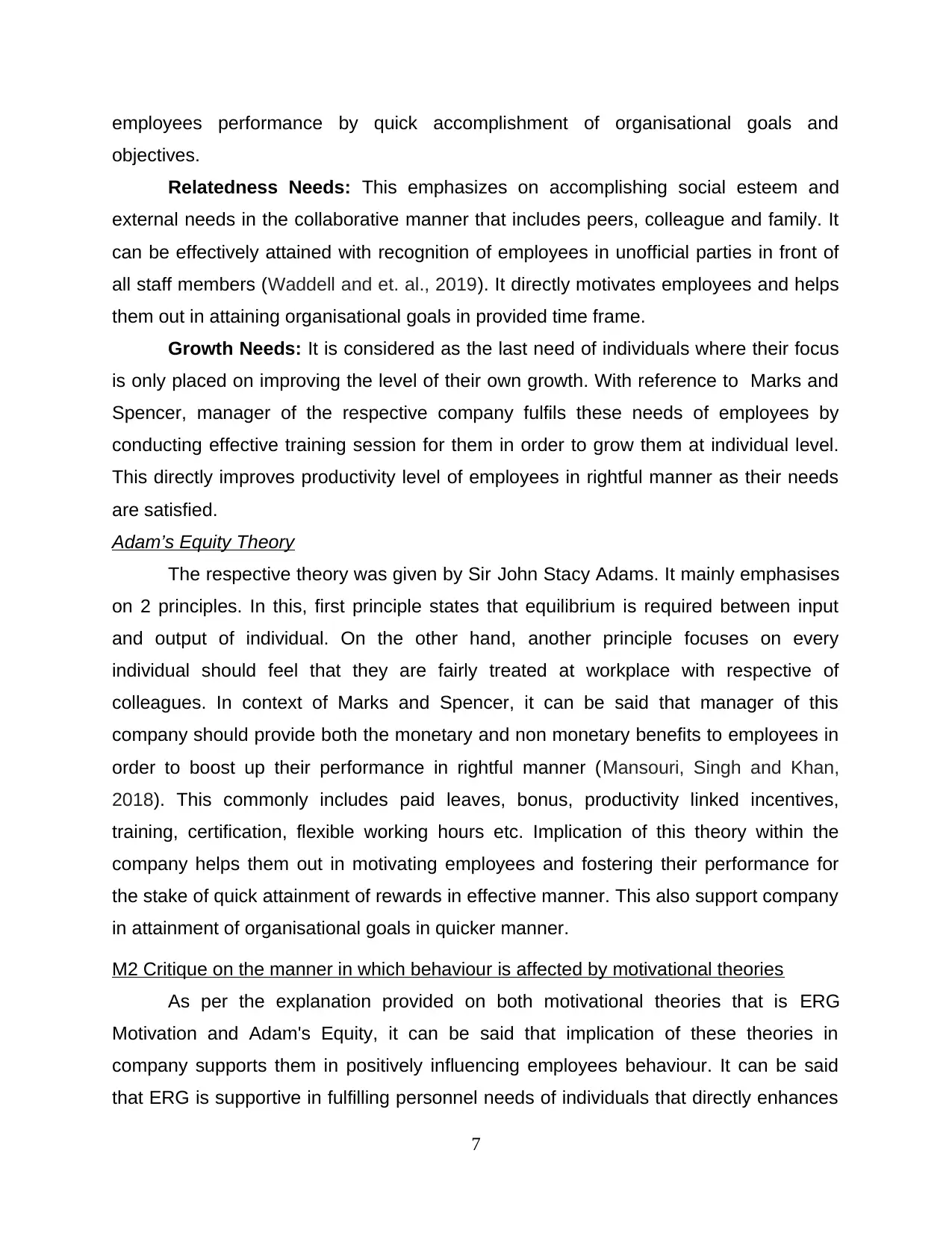
employees performance by quick accomplishment of organisational goals and
objectives.
Relatedness Needs: This emphasizes on accomplishing social esteem and
external needs in the collaborative manner that includes peers, colleague and family. It
can be effectively attained with recognition of employees in unofficial parties in front of
all staff members (Waddell and et. al., 2019). It directly motivates employees and helps
them out in attaining organisational goals in provided time frame.
Growth Needs: It is considered as the last need of individuals where their focus
is only placed on improving the level of their own growth. With reference to Marks and
Spencer, manager of the respective company fulfils these needs of employees by
conducting effective training session for them in order to grow them at individual level.
This directly improves productivity level of employees in rightful manner as their needs
are satisfied.
Adam’s Equity Theory
The respective theory was given by Sir John Stacy Adams. It mainly emphasises
on 2 principles. In this, first principle states that equilibrium is required between input
and output of individual. On the other hand, another principle focuses on every
individual should feel that they are fairly treated at workplace with respective of
colleagues. In context of Marks and Spencer, it can be said that manager of this
company should provide both the monetary and non monetary benefits to employees in
order to boost up their performance in rightful manner (Mansouri, Singh and Khan,
2018). This commonly includes paid leaves, bonus, productivity linked incentives,
training, certification, flexible working hours etc. Implication of this theory within the
company helps them out in motivating employees and fostering their performance for
the stake of quick attainment of rewards in effective manner. This also support company
in attainment of organisational goals in quicker manner.
M2 Critique on the manner in which behaviour is affected by motivational theories
As per the explanation provided on both motivational theories that is ERG
Motivation and Adam's Equity, it can be said that implication of these theories in
company supports them in positively influencing employees behaviour. It can be said
that ERG is supportive in fulfilling personnel needs of individuals that directly enhances
7
objectives.
Relatedness Needs: This emphasizes on accomplishing social esteem and
external needs in the collaborative manner that includes peers, colleague and family. It
can be effectively attained with recognition of employees in unofficial parties in front of
all staff members (Waddell and et. al., 2019). It directly motivates employees and helps
them out in attaining organisational goals in provided time frame.
Growth Needs: It is considered as the last need of individuals where their focus
is only placed on improving the level of their own growth. With reference to Marks and
Spencer, manager of the respective company fulfils these needs of employees by
conducting effective training session for them in order to grow them at individual level.
This directly improves productivity level of employees in rightful manner as their needs
are satisfied.
Adam’s Equity Theory
The respective theory was given by Sir John Stacy Adams. It mainly emphasises
on 2 principles. In this, first principle states that equilibrium is required between input
and output of individual. On the other hand, another principle focuses on every
individual should feel that they are fairly treated at workplace with respective of
colleagues. In context of Marks and Spencer, it can be said that manager of this
company should provide both the monetary and non monetary benefits to employees in
order to boost up their performance in rightful manner (Mansouri, Singh and Khan,
2018). This commonly includes paid leaves, bonus, productivity linked incentives,
training, certification, flexible working hours etc. Implication of this theory within the
company helps them out in motivating employees and fostering their performance for
the stake of quick attainment of rewards in effective manner. This also support company
in attainment of organisational goals in quicker manner.
M2 Critique on the manner in which behaviour is affected by motivational theories
As per the explanation provided on both motivational theories that is ERG
Motivation and Adam's Equity, it can be said that implication of these theories in
company supports them in positively influencing employees behaviour. It can be said
that ERG is supportive in fulfilling personnel needs of individuals that directly enhances
7
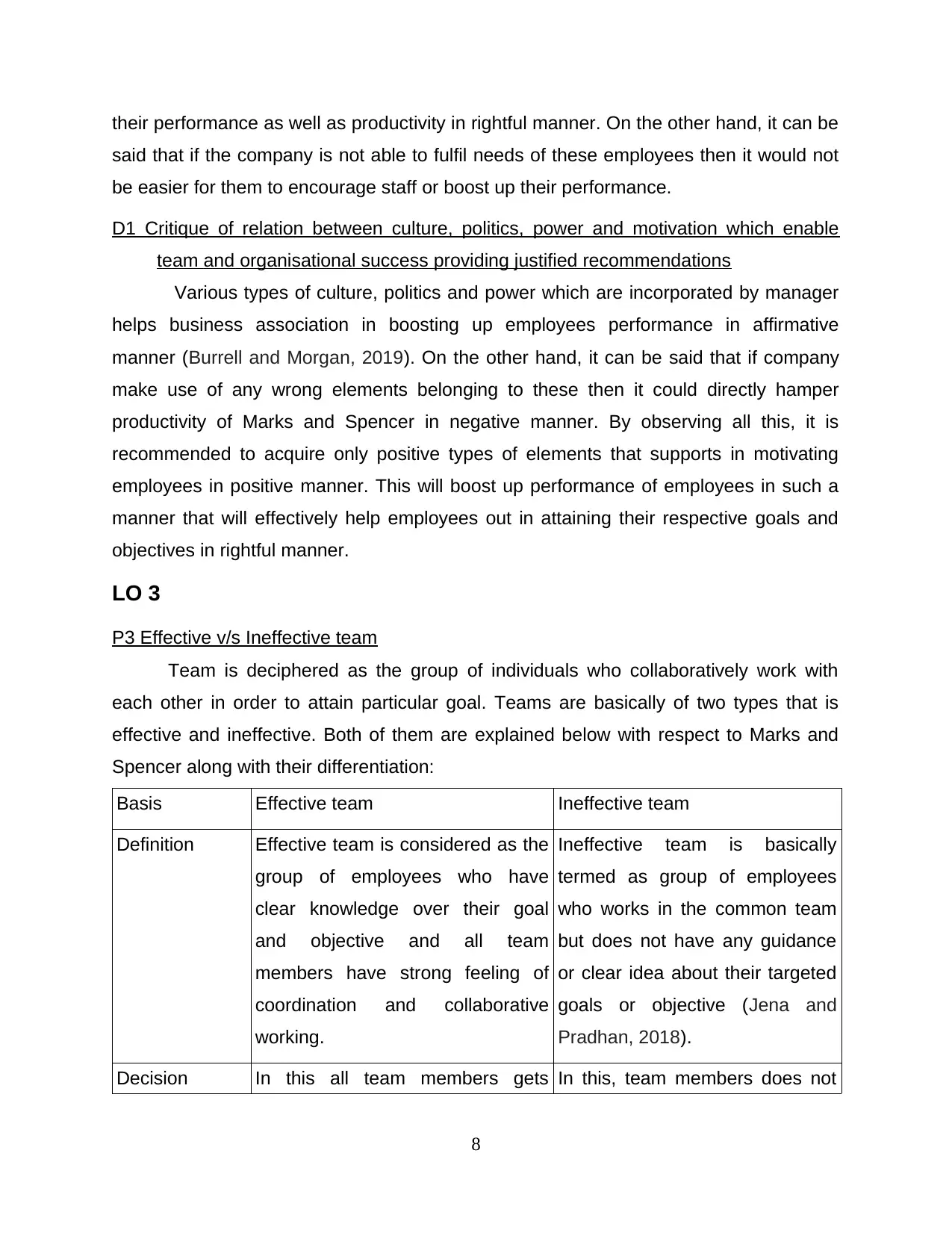
their performance as well as productivity in rightful manner. On the other hand, it can be
said that if the company is not able to fulfil needs of these employees then it would not
be easier for them to encourage staff or boost up their performance.
D1 Critique of relation between culture, politics, power and motivation which enable
team and organisational success providing justified recommendations
Various types of culture, politics and power which are incorporated by manager
helps business association in boosting up employees performance in affirmative
manner (Burrell and Morgan, 2019). On the other hand, it can be said that if company
make use of any wrong elements belonging to these then it could directly hamper
productivity of Marks and Spencer in negative manner. By observing all this, it is
recommended to acquire only positive types of elements that supports in motivating
employees in positive manner. This will boost up performance of employees in such a
manner that will effectively help employees out in attaining their respective goals and
objectives in rightful manner.
LO 3
P3 Effective v/s Ineffective team
Team is deciphered as the group of individuals who collaboratively work with
each other in order to attain particular goal. Teams are basically of two types that is
effective and ineffective. Both of them are explained below with respect to Marks and
Spencer along with their differentiation:
Basis Effective team Ineffective team
Definition Effective team is considered as the
group of employees who have
clear knowledge over their goal
and objective and all team
members have strong feeling of
coordination and collaborative
working.
Ineffective team is basically
termed as group of employees
who works in the common team
but does not have any guidance
or clear idea about their targeted
goals or objective (Jena and
Pradhan, 2018).
Decision In this all team members gets In this, team members does not
8
said that if the company is not able to fulfil needs of these employees then it would not
be easier for them to encourage staff or boost up their performance.
D1 Critique of relation between culture, politics, power and motivation which enable
team and organisational success providing justified recommendations
Various types of culture, politics and power which are incorporated by manager
helps business association in boosting up employees performance in affirmative
manner (Burrell and Morgan, 2019). On the other hand, it can be said that if company
make use of any wrong elements belonging to these then it could directly hamper
productivity of Marks and Spencer in negative manner. By observing all this, it is
recommended to acquire only positive types of elements that supports in motivating
employees in positive manner. This will boost up performance of employees in such a
manner that will effectively help employees out in attaining their respective goals and
objectives in rightful manner.
LO 3
P3 Effective v/s Ineffective team
Team is deciphered as the group of individuals who collaboratively work with
each other in order to attain particular goal. Teams are basically of two types that is
effective and ineffective. Both of them are explained below with respect to Marks and
Spencer along with their differentiation:
Basis Effective team Ineffective team
Definition Effective team is considered as the
group of employees who have
clear knowledge over their goal
and objective and all team
members have strong feeling of
coordination and collaborative
working.
Ineffective team is basically
termed as group of employees
who works in the common team
but does not have any guidance
or clear idea about their targeted
goals or objective (Jena and
Pradhan, 2018).
Decision In this all team members gets In this, team members does not
8
Secure Best Marks with AI Grader
Need help grading? Try our AI Grader for instant feedback on your assignments.
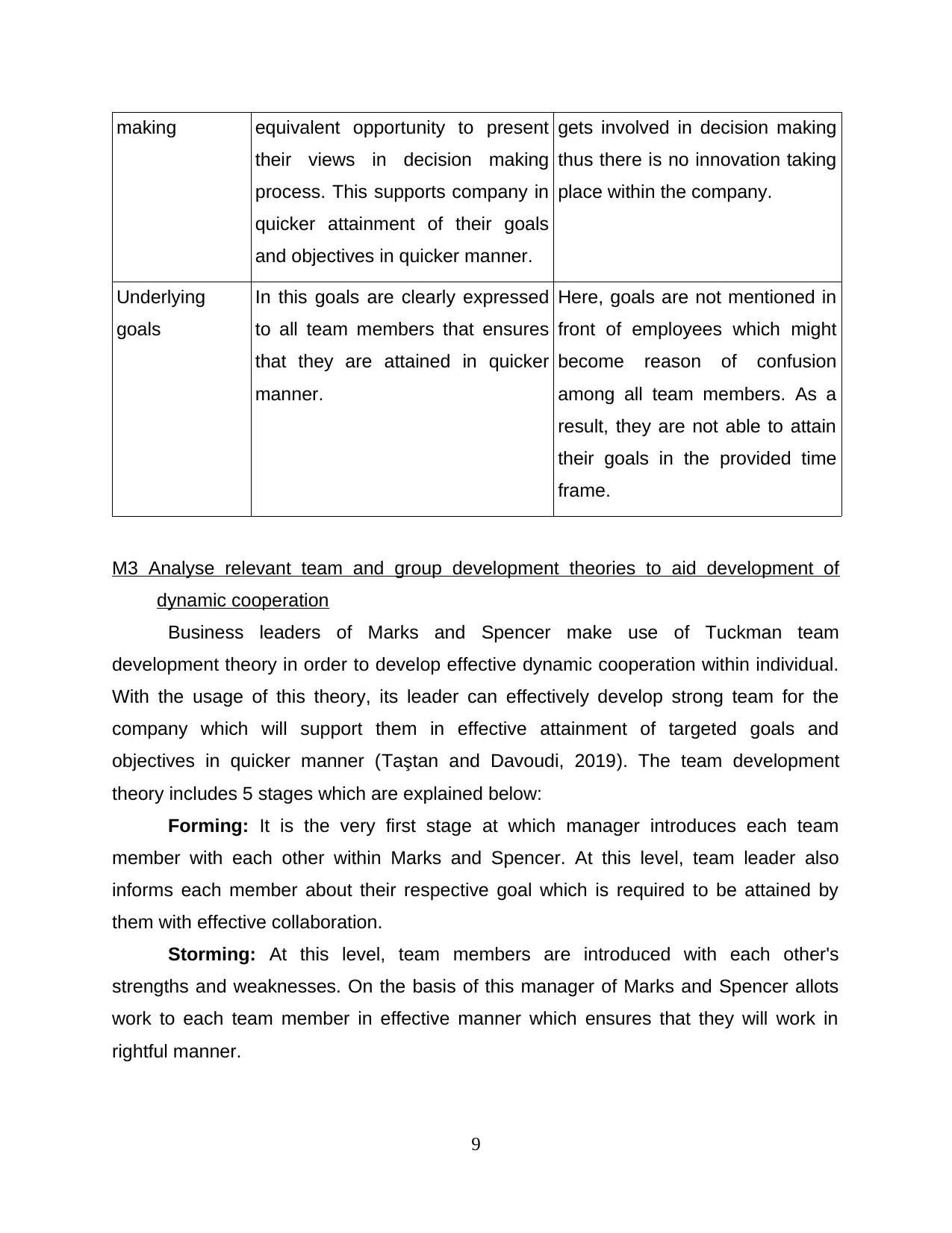
making equivalent opportunity to present
their views in decision making
process. This supports company in
quicker attainment of their goals
and objectives in quicker manner.
gets involved in decision making
thus there is no innovation taking
place within the company.
Underlying
goals
In this goals are clearly expressed
to all team members that ensures
that they are attained in quicker
manner.
Here, goals are not mentioned in
front of employees which might
become reason of confusion
among all team members. As a
result, they are not able to attain
their goals in the provided time
frame.
M3 Analyse relevant team and group development theories to aid development of
dynamic cooperation
Business leaders of Marks and Spencer make use of Tuckman team
development theory in order to develop effective dynamic cooperation within individual.
With the usage of this theory, its leader can effectively develop strong team for the
company which will support them in effective attainment of targeted goals and
objectives in quicker manner (Taştan and Davoudi, 2019). The team development
theory includes 5 stages which are explained below:
Forming: It is the very first stage at which manager introduces each team
member with each other within Marks and Spencer. At this level, team leader also
informs each member about their respective goal which is required to be attained by
them with effective collaboration.
Storming: At this level, team members are introduced with each other's
strengths and weaknesses. On the basis of this manager of Marks and Spencer allots
work to each team member in effective manner which ensures that they will work in
rightful manner.
9
their views in decision making
process. This supports company in
quicker attainment of their goals
and objectives in quicker manner.
gets involved in decision making
thus there is no innovation taking
place within the company.
Underlying
goals
In this goals are clearly expressed
to all team members that ensures
that they are attained in quicker
manner.
Here, goals are not mentioned in
front of employees which might
become reason of confusion
among all team members. As a
result, they are not able to attain
their goals in the provided time
frame.
M3 Analyse relevant team and group development theories to aid development of
dynamic cooperation
Business leaders of Marks and Spencer make use of Tuckman team
development theory in order to develop effective dynamic cooperation within individual.
With the usage of this theory, its leader can effectively develop strong team for the
company which will support them in effective attainment of targeted goals and
objectives in quicker manner (Taştan and Davoudi, 2019). The team development
theory includes 5 stages which are explained below:
Forming: It is the very first stage at which manager introduces each team
member with each other within Marks and Spencer. At this level, team leader also
informs each member about their respective goal which is required to be attained by
them with effective collaboration.
Storming: At this level, team members are introduced with each other's
strengths and weaknesses. On the basis of this manager of Marks and Spencer allots
work to each team member in effective manner which ensures that they will work in
rightful manner.
9
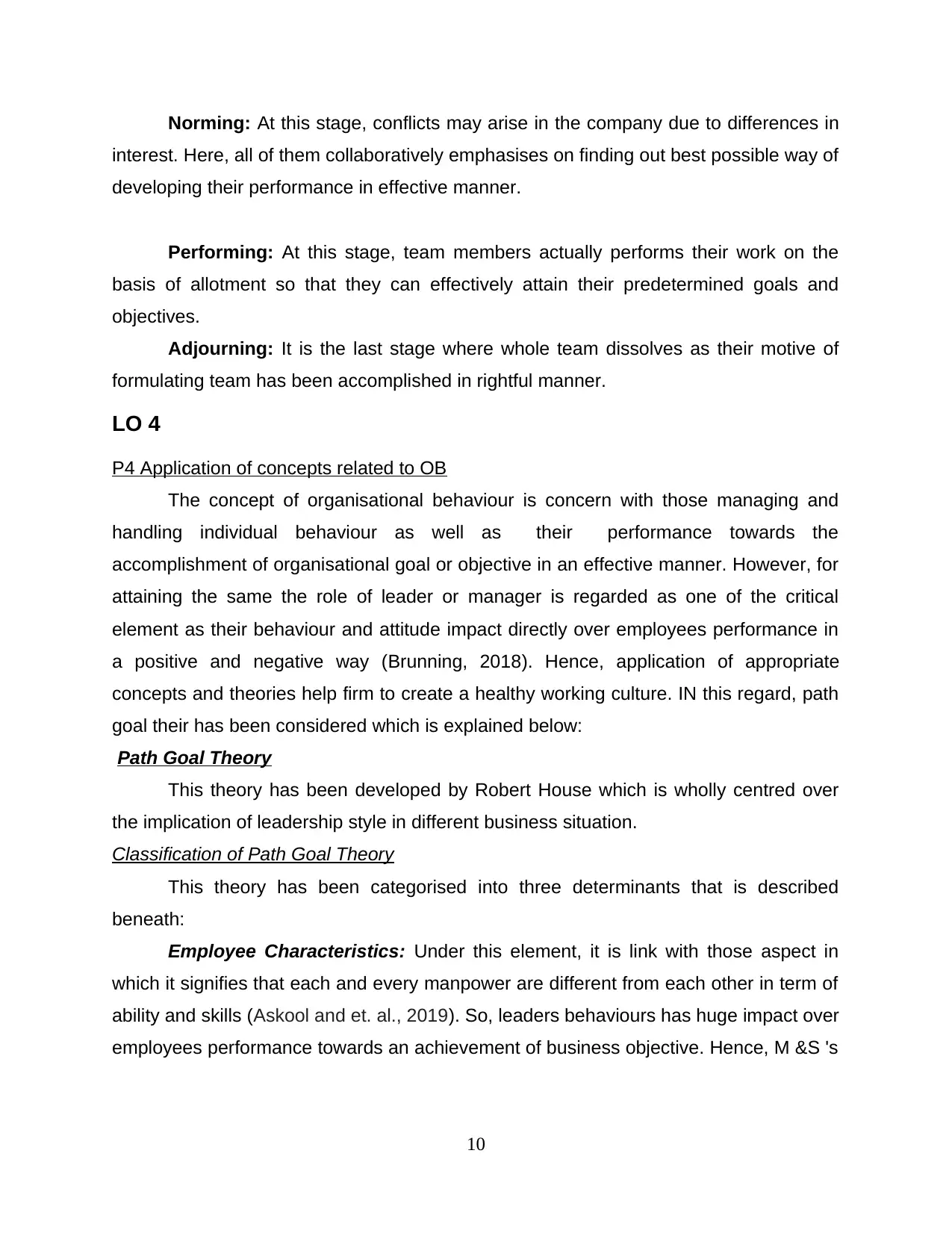
Norming: At this stage, conflicts may arise in the company due to differences in
interest. Here, all of them collaboratively emphasises on finding out best possible way of
developing their performance in effective manner.
Performing: At this stage, team members actually performs their work on the
basis of allotment so that they can effectively attain their predetermined goals and
objectives.
Adjourning: It is the last stage where whole team dissolves as their motive of
formulating team has been accomplished in rightful manner.
LO 4
P4 Application of concepts related to OB
The concept of organisational behaviour is concern with those managing and
handling individual behaviour as well as their performance towards the
accomplishment of organisational goal or objective in an effective manner. However, for
attaining the same the role of leader or manager is regarded as one of the critical
element as their behaviour and attitude impact directly over employees performance in
a positive and negative way (Brunning, 2018). Hence, application of appropriate
concepts and theories help firm to create a healthy working culture. IN this regard, path
goal their has been considered which is explained below:
Path Goal Theory
This theory has been developed by Robert House which is wholly centred over
the implication of leadership style in different business situation.
Classification of Path Goal Theory
This theory has been categorised into three determinants that is described
beneath:
Employee Characteristics: Under this element, it is link with those aspect in
which it signifies that each and every manpower are different from each other in term of
ability and skills (Askool and et. al., 2019). So, leaders behaviours has huge impact over
employees performance towards an achievement of business objective. Hence, M &S 's
10
interest. Here, all of them collaboratively emphasises on finding out best possible way of
developing their performance in effective manner.
Performing: At this stage, team members actually performs their work on the
basis of allotment so that they can effectively attain their predetermined goals and
objectives.
Adjourning: It is the last stage where whole team dissolves as their motive of
formulating team has been accomplished in rightful manner.
LO 4
P4 Application of concepts related to OB
The concept of organisational behaviour is concern with those managing and
handling individual behaviour as well as their performance towards the
accomplishment of organisational goal or objective in an effective manner. However, for
attaining the same the role of leader or manager is regarded as one of the critical
element as their behaviour and attitude impact directly over employees performance in
a positive and negative way (Brunning, 2018). Hence, application of appropriate
concepts and theories help firm to create a healthy working culture. IN this regard, path
goal their has been considered which is explained below:
Path Goal Theory
This theory has been developed by Robert House which is wholly centred over
the implication of leadership style in different business situation.
Classification of Path Goal Theory
This theory has been categorised into three determinants that is described
beneath:
Employee Characteristics: Under this element, it is link with those aspect in
which it signifies that each and every manpower are different from each other in term of
ability and skills (Askool and et. al., 2019). So, leaders behaviours has huge impact over
employees performance towards an achievement of business objective. Hence, M &S 's
10
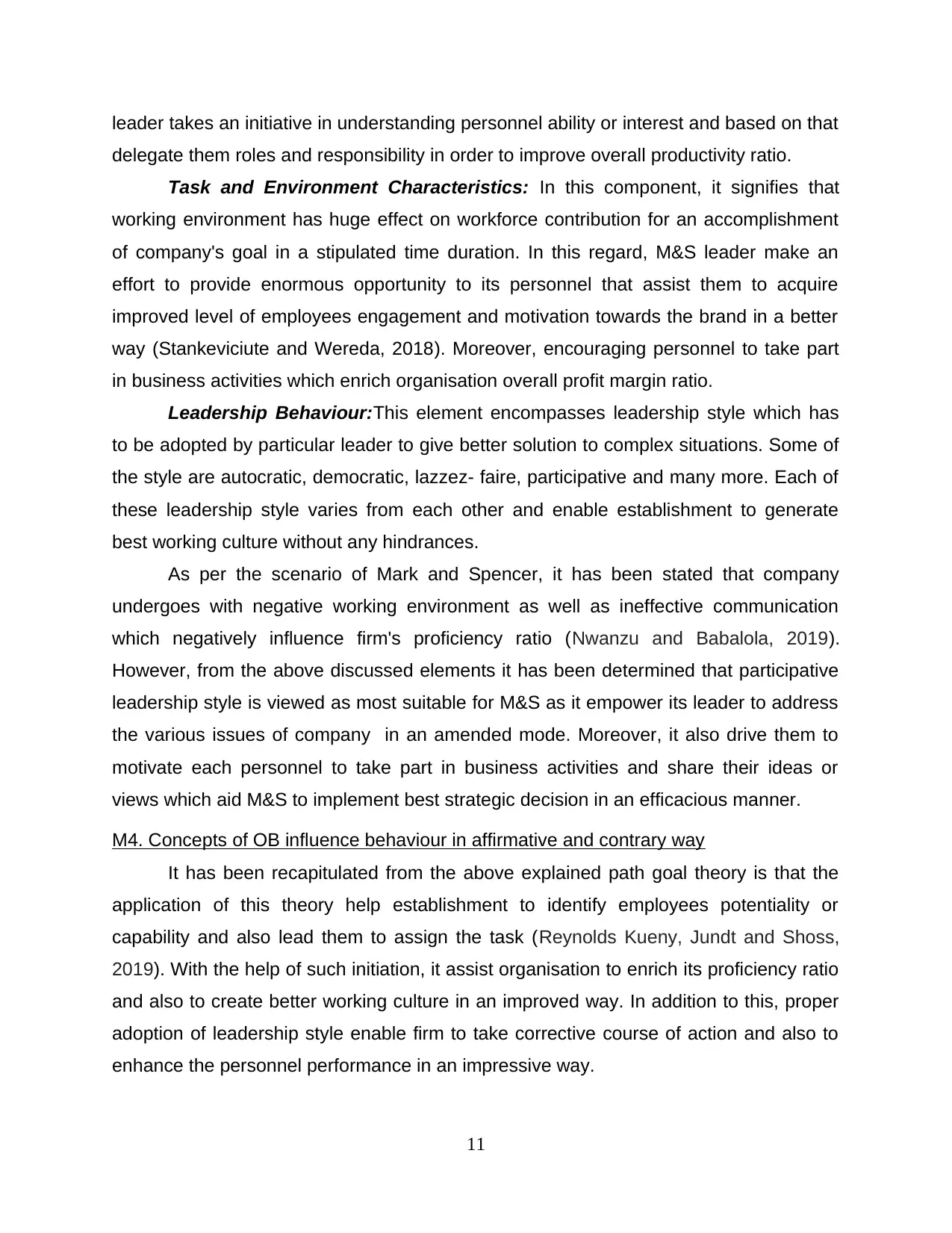
leader takes an initiative in understanding personnel ability or interest and based on that
delegate them roles and responsibility in order to improve overall productivity ratio.
Task and Environment Characteristics: In this component, it signifies that
working environment has huge effect on workforce contribution for an accomplishment
of company's goal in a stipulated time duration. In this regard, M&S leader make an
effort to provide enormous opportunity to its personnel that assist them to acquire
improved level of employees engagement and motivation towards the brand in a better
way (Stankeviciute and Wereda, 2018). Moreover, encouraging personnel to take part
in business activities which enrich organisation overall profit margin ratio.
Leadership Behaviour:This element encompasses leadership style which has
to be adopted by particular leader to give better solution to complex situations. Some of
the style are autocratic, democratic, lazzez- faire, participative and many more. Each of
these leadership style varies from each other and enable establishment to generate
best working culture without any hindrances.
As per the scenario of Mark and Spencer, it has been stated that company
undergoes with negative working environment as well as ineffective communication
which negatively influence firm's proficiency ratio (Nwanzu and Babalola, 2019).
However, from the above discussed elements it has been determined that participative
leadership style is viewed as most suitable for M&S as it empower its leader to address
the various issues of company in an amended mode. Moreover, it also drive them to
motivate each personnel to take part in business activities and share their ideas or
views which aid M&S to implement best strategic decision in an efficacious manner.
M4. Concepts of OB influence behaviour in affirmative and contrary way
It has been recapitulated from the above explained path goal theory is that the
application of this theory help establishment to identify employees potentiality or
capability and also lead them to assign the task (Reynolds Kueny, Jundt and Shoss,
2019). With the help of such initiation, it assist organisation to enrich its proficiency ratio
and also to create better working culture in an improved way. In addition to this, proper
adoption of leadership style enable firm to take corrective course of action and also to
enhance the personnel performance in an impressive way.
11
delegate them roles and responsibility in order to improve overall productivity ratio.
Task and Environment Characteristics: In this component, it signifies that
working environment has huge effect on workforce contribution for an accomplishment
of company's goal in a stipulated time duration. In this regard, M&S leader make an
effort to provide enormous opportunity to its personnel that assist them to acquire
improved level of employees engagement and motivation towards the brand in a better
way (Stankeviciute and Wereda, 2018). Moreover, encouraging personnel to take part
in business activities which enrich organisation overall profit margin ratio.
Leadership Behaviour:This element encompasses leadership style which has
to be adopted by particular leader to give better solution to complex situations. Some of
the style are autocratic, democratic, lazzez- faire, participative and many more. Each of
these leadership style varies from each other and enable establishment to generate
best working culture without any hindrances.
As per the scenario of Mark and Spencer, it has been stated that company
undergoes with negative working environment as well as ineffective communication
which negatively influence firm's proficiency ratio (Nwanzu and Babalola, 2019).
However, from the above discussed elements it has been determined that participative
leadership style is viewed as most suitable for M&S as it empower its leader to address
the various issues of company in an amended mode. Moreover, it also drive them to
motivate each personnel to take part in business activities and share their ideas or
views which aid M&S to implement best strategic decision in an efficacious manner.
M4. Concepts of OB influence behaviour in affirmative and contrary way
It has been recapitulated from the above explained path goal theory is that the
application of this theory help establishment to identify employees potentiality or
capability and also lead them to assign the task (Reynolds Kueny, Jundt and Shoss,
2019). With the help of such initiation, it assist organisation to enrich its proficiency ratio
and also to create better working culture in an improved way. In addition to this, proper
adoption of leadership style enable firm to take corrective course of action and also to
enhance the personnel performance in an impressive way.
11
Paraphrase This Document
Need a fresh take? Get an instant paraphrase of this document with our AI Paraphraser
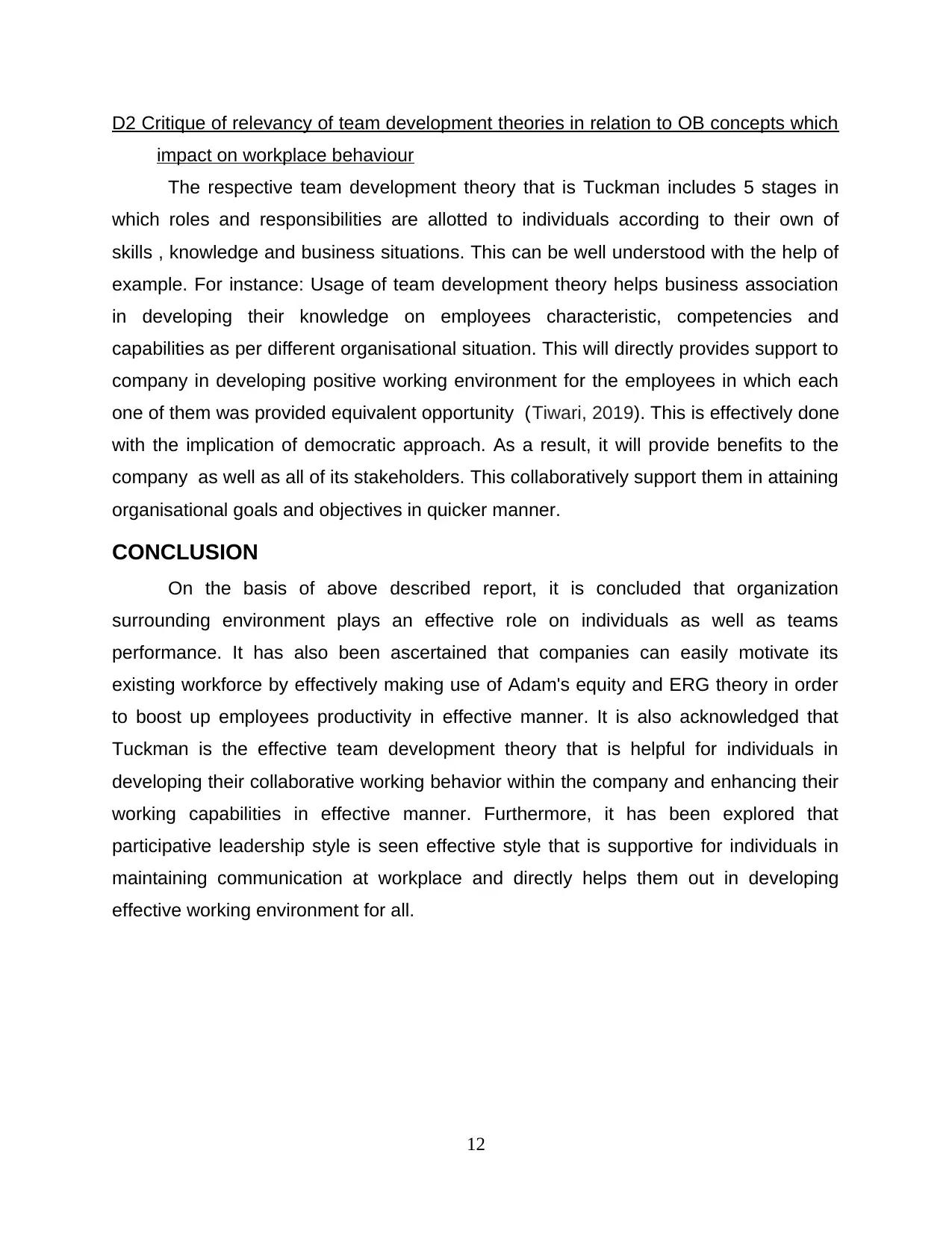
D2 Critique of relevancy of team development theories in relation to OB concepts which
impact on workplace behaviour
The respective team development theory that is Tuckman includes 5 stages in
which roles and responsibilities are allotted to individuals according to their own of
skills , knowledge and business situations. This can be well understood with the help of
example. For instance: Usage of team development theory helps business association
in developing their knowledge on employees characteristic, competencies and
capabilities as per different organisational situation. This will directly provides support to
company in developing positive working environment for the employees in which each
one of them was provided equivalent opportunity (Tiwari, 2019). This is effectively done
with the implication of democratic approach. As a result, it will provide benefits to the
company as well as all of its stakeholders. This collaboratively support them in attaining
organisational goals and objectives in quicker manner.
CONCLUSION
On the basis of above described report, it is concluded that organization
surrounding environment plays an effective role on individuals as well as teams
performance. It has also been ascertained that companies can easily motivate its
existing workforce by effectively making use of Adam's equity and ERG theory in order
to boost up employees productivity in effective manner. It is also acknowledged that
Tuckman is the effective team development theory that is helpful for individuals in
developing their collaborative working behavior within the company and enhancing their
working capabilities in effective manner. Furthermore, it has been explored that
participative leadership style is seen effective style that is supportive for individuals in
maintaining communication at workplace and directly helps them out in developing
effective working environment for all.
12
impact on workplace behaviour
The respective team development theory that is Tuckman includes 5 stages in
which roles and responsibilities are allotted to individuals according to their own of
skills , knowledge and business situations. This can be well understood with the help of
example. For instance: Usage of team development theory helps business association
in developing their knowledge on employees characteristic, competencies and
capabilities as per different organisational situation. This will directly provides support to
company in developing positive working environment for the employees in which each
one of them was provided equivalent opportunity (Tiwari, 2019). This is effectively done
with the implication of democratic approach. As a result, it will provide benefits to the
company as well as all of its stakeholders. This collaboratively support them in attaining
organisational goals and objectives in quicker manner.
CONCLUSION
On the basis of above described report, it is concluded that organization
surrounding environment plays an effective role on individuals as well as teams
performance. It has also been ascertained that companies can easily motivate its
existing workforce by effectively making use of Adam's equity and ERG theory in order
to boost up employees productivity in effective manner. It is also acknowledged that
Tuckman is the effective team development theory that is helpful for individuals in
developing their collaborative working behavior within the company and enhancing their
working capabilities in effective manner. Furthermore, it has been explored that
participative leadership style is seen effective style that is supportive for individuals in
maintaining communication at workplace and directly helps them out in developing
effective working environment for all.
12
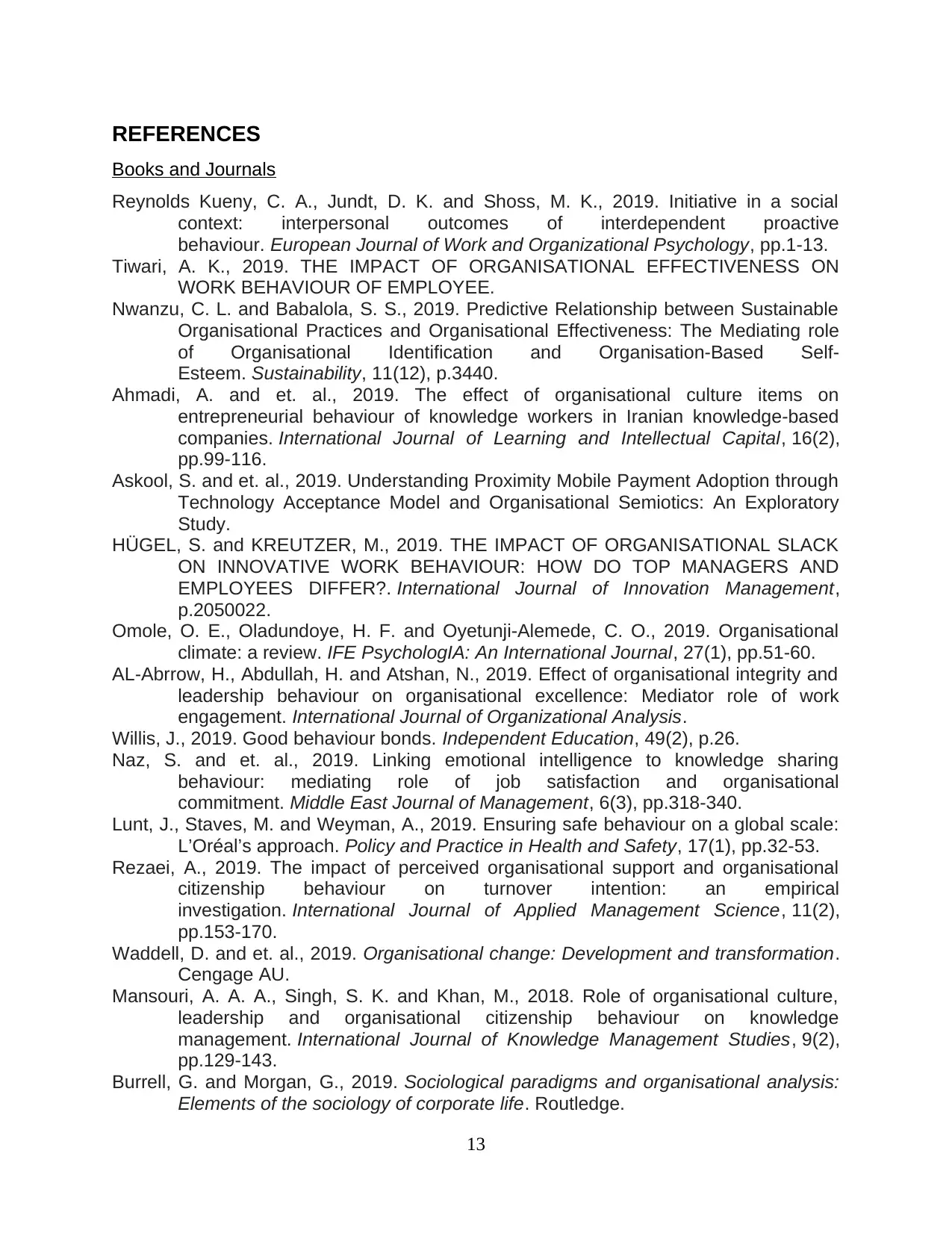
REFERENCES
Books and Journals
Reynolds Kueny, C. A., Jundt, D. K. and Shoss, M. K., 2019. Initiative in a social
context: interpersonal outcomes of interdependent proactive
behaviour. European Journal of Work and Organizational Psychology, pp.1-13.
Tiwari, A. K., 2019. THE IMPACT OF ORGANISATIONAL EFFECTIVENESS ON
WORK BEHAVIOUR OF EMPLOYEE.
Nwanzu, C. L. and Babalola, S. S., 2019. Predictive Relationship between Sustainable
Organisational Practices and Organisational Effectiveness: The Mediating role
of Organisational Identification and Organisation-Based Self-
Esteem. Sustainability, 11(12), p.3440.
Ahmadi, A. and et. al., 2019. The effect of organisational culture items on
entrepreneurial behaviour of knowledge workers in Iranian knowledge-based
companies. International Journal of Learning and Intellectual Capital, 16(2),
pp.99-116.
Askool, S. and et. al., 2019. Understanding Proximity Mobile Payment Adoption through
Technology Acceptance Model and Organisational Semiotics: An Exploratory
Study.
HÜGEL, S. and KREUTZER, M., 2019. THE IMPACT OF ORGANISATIONAL SLACK
ON INNOVATIVE WORK BEHAVIOUR: HOW DO TOP MANAGERS AND
EMPLOYEES DIFFER?. International Journal of Innovation Management,
p.2050022.
Omole, O. E., Oladundoye, H. F. and Oyetunji-Alemede, C. O., 2019. Organisational
climate: a review. IFE PsychologIA: An International Journal, 27(1), pp.51-60.
AL-Abrrow, H., Abdullah, H. and Atshan, N., 2019. Effect of organisational integrity and
leadership behaviour on organisational excellence: Mediator role of work
engagement. International Journal of Organizational Analysis.
Willis, J., 2019. Good behaviour bonds. Independent Education, 49(2), p.26.
Naz, S. and et. al., 2019. Linking emotional intelligence to knowledge sharing
behaviour: mediating role of job satisfaction and organisational
commitment. Middle East Journal of Management, 6(3), pp.318-340.
Lunt, J., Staves, M. and Weyman, A., 2019. Ensuring safe behaviour on a global scale:
L’Oréal’s approach. Policy and Practice in Health and Safety, 17(1), pp.32-53.
Rezaei, A., 2019. The impact of perceived organisational support and organisational
citizenship behaviour on turnover intention: an empirical
investigation. International Journal of Applied Management Science, 11(2),
pp.153-170.
Waddell, D. and et. al., 2019. Organisational change: Development and transformation.
Cengage AU.
Mansouri, A. A. A., Singh, S. K. and Khan, M., 2018. Role of organisational culture,
leadership and organisational citizenship behaviour on knowledge
management. International Journal of Knowledge Management Studies, 9(2),
pp.129-143.
Burrell, G. and Morgan, G., 2019. Sociological paradigms and organisational analysis:
Elements of the sociology of corporate life. Routledge.
13
Books and Journals
Reynolds Kueny, C. A., Jundt, D. K. and Shoss, M. K., 2019. Initiative in a social
context: interpersonal outcomes of interdependent proactive
behaviour. European Journal of Work and Organizational Psychology, pp.1-13.
Tiwari, A. K., 2019. THE IMPACT OF ORGANISATIONAL EFFECTIVENESS ON
WORK BEHAVIOUR OF EMPLOYEE.
Nwanzu, C. L. and Babalola, S. S., 2019. Predictive Relationship between Sustainable
Organisational Practices and Organisational Effectiveness: The Mediating role
of Organisational Identification and Organisation-Based Self-
Esteem. Sustainability, 11(12), p.3440.
Ahmadi, A. and et. al., 2019. The effect of organisational culture items on
entrepreneurial behaviour of knowledge workers in Iranian knowledge-based
companies. International Journal of Learning and Intellectual Capital, 16(2),
pp.99-116.
Askool, S. and et. al., 2019. Understanding Proximity Mobile Payment Adoption through
Technology Acceptance Model and Organisational Semiotics: An Exploratory
Study.
HÜGEL, S. and KREUTZER, M., 2019. THE IMPACT OF ORGANISATIONAL SLACK
ON INNOVATIVE WORK BEHAVIOUR: HOW DO TOP MANAGERS AND
EMPLOYEES DIFFER?. International Journal of Innovation Management,
p.2050022.
Omole, O. E., Oladundoye, H. F. and Oyetunji-Alemede, C. O., 2019. Organisational
climate: a review. IFE PsychologIA: An International Journal, 27(1), pp.51-60.
AL-Abrrow, H., Abdullah, H. and Atshan, N., 2019. Effect of organisational integrity and
leadership behaviour on organisational excellence: Mediator role of work
engagement. International Journal of Organizational Analysis.
Willis, J., 2019. Good behaviour bonds. Independent Education, 49(2), p.26.
Naz, S. and et. al., 2019. Linking emotional intelligence to knowledge sharing
behaviour: mediating role of job satisfaction and organisational
commitment. Middle East Journal of Management, 6(3), pp.318-340.
Lunt, J., Staves, M. and Weyman, A., 2019. Ensuring safe behaviour on a global scale:
L’Oréal’s approach. Policy and Practice in Health and Safety, 17(1), pp.32-53.
Rezaei, A., 2019. The impact of perceived organisational support and organisational
citizenship behaviour on turnover intention: an empirical
investigation. International Journal of Applied Management Science, 11(2),
pp.153-170.
Waddell, D. and et. al., 2019. Organisational change: Development and transformation.
Cengage AU.
Mansouri, A. A. A., Singh, S. K. and Khan, M., 2018. Role of organisational culture,
leadership and organisational citizenship behaviour on knowledge
management. International Journal of Knowledge Management Studies, 9(2),
pp.129-143.
Burrell, G. and Morgan, G., 2019. Sociological paradigms and organisational analysis:
Elements of the sociology of corporate life. Routledge.
13
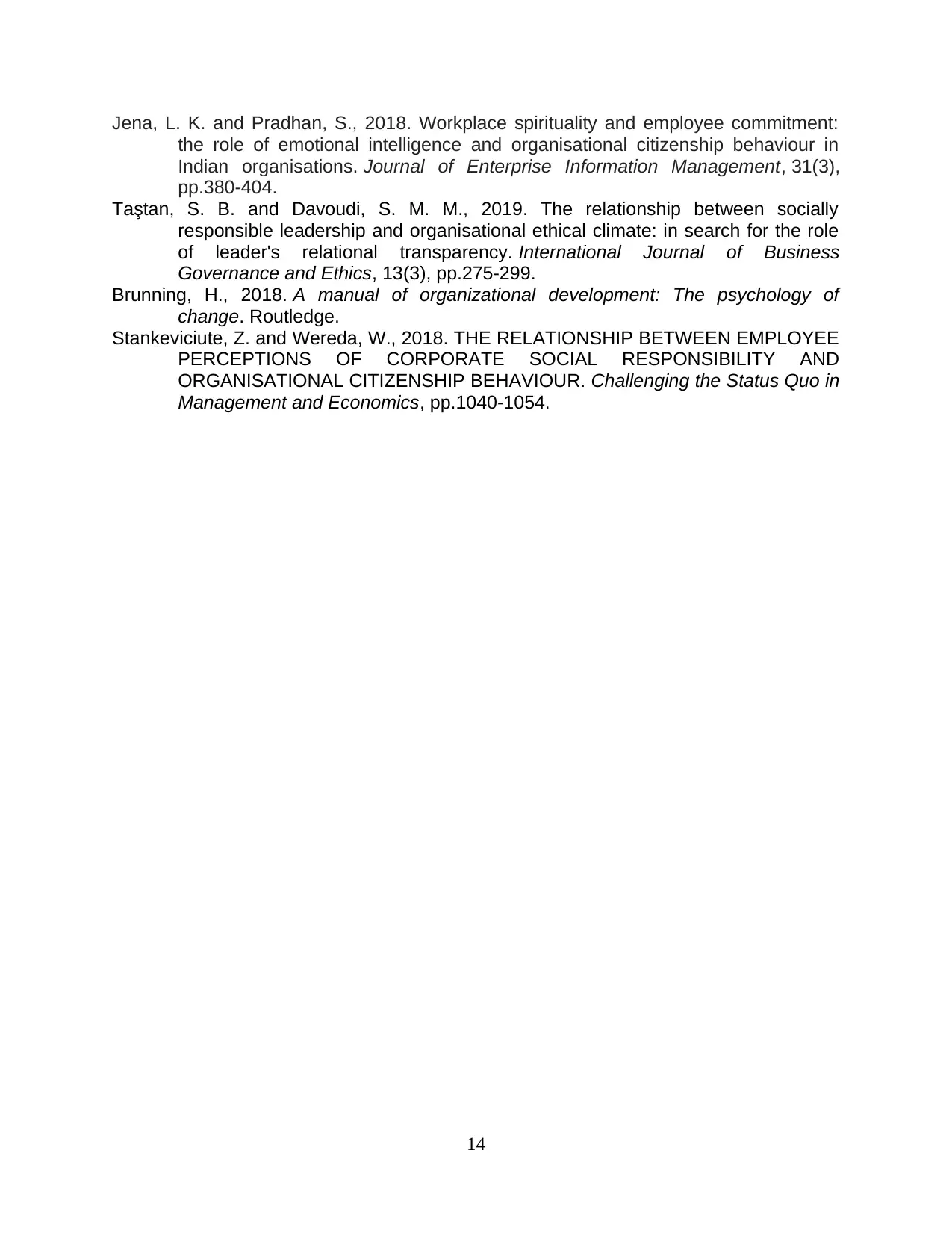
Jena, L. K. and Pradhan, S., 2018. Workplace spirituality and employee commitment:
the role of emotional intelligence and organisational citizenship behaviour in
Indian organisations. Journal of Enterprise Information Management, 31(3),
pp.380-404.
Taştan, S. B. and Davoudi, S. M. M., 2019. The relationship between socially
responsible leadership and organisational ethical climate: in search for the role
of leader's relational transparency. International Journal of Business
Governance and Ethics, 13(3), pp.275-299.
Brunning, H., 2018. A manual of organizational development: The psychology of
change. Routledge.
Stankeviciute, Z. and Wereda, W., 2018. THE RELATIONSHIP BETWEEN EMPLOYEE
PERCEPTIONS OF CORPORATE SOCIAL RESPONSIBILITY AND
ORGANISATIONAL CITIZENSHIP BEHAVIOUR. Challenging the Status Quo in
Management and Economics, pp.1040-1054.
14
the role of emotional intelligence and organisational citizenship behaviour in
Indian organisations. Journal of Enterprise Information Management, 31(3),
pp.380-404.
Taştan, S. B. and Davoudi, S. M. M., 2019. The relationship between socially
responsible leadership and organisational ethical climate: in search for the role
of leader's relational transparency. International Journal of Business
Governance and Ethics, 13(3), pp.275-299.
Brunning, H., 2018. A manual of organizational development: The psychology of
change. Routledge.
Stankeviciute, Z. and Wereda, W., 2018. THE RELATIONSHIP BETWEEN EMPLOYEE
PERCEPTIONS OF CORPORATE SOCIAL RESPONSIBILITY AND
ORGANISATIONAL CITIZENSHIP BEHAVIOUR. Challenging the Status Quo in
Management and Economics, pp.1040-1054.
14
1 out of 16
Related Documents
Your All-in-One AI-Powered Toolkit for Academic Success.
+13062052269
info@desklib.com
Available 24*7 on WhatsApp / Email
![[object Object]](/_next/static/media/star-bottom.7253800d.svg)
Unlock your academic potential
© 2024 | Zucol Services PVT LTD | All rights reserved.





